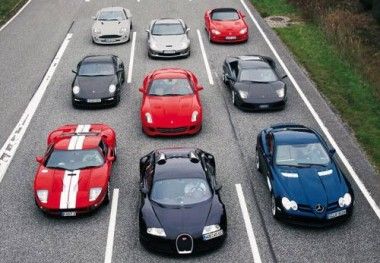Skip to comments.
Bugatti Veyron 16.4: Behind the wheel of the fastest and most powerful production car in the world.
RoadandTrack.com ^
| December 30,2006
| By Patrick Hong
Posted on 12/30/2006 6:12:00 PM PST by sully777
click here to read article
Navigation: use the links below to view more comments.
first previous 1-20, 21-40, 41-50 last
To: Professional Engineer
Only 987bhp from 8 liters. Heck, Chuck Norris could've done that in 4.Chuck Norris never uses a car or airplane for transportation.
He just roundhouse kicks into the ground at a set angle and pushes the Earth away enough that when he lands he is at his destination.
Chuck Norris can produce 987bhp. With his fist.
41
posted on
12/30/2006 8:25:19 PM PST
by
ikka
To: ikka
He just roundhouse kicks into the ground at a set angle and pushes the Earth away enough that when he lands he is at his destination.Ooooo, that's good.
42
posted on
12/30/2006 8:30:23 PM PST
by
Professional Engineer
(As far as we know, all numbers are imaginary. some just hurt your brain more than others. ~ lepton)
To: irishtenor
When you spend 1.2 million for a car gas mileage is a minor concern. I read that at top speed the thing is burning gas so fast you would drain a tank in about 12 minutes. Granted you are doing better than 4 miles a minute so you might pass a gas station or two in that time.
43
posted on
12/30/2006 9:42:53 PM PST
by
xp38
Some beautiful cars

Bugatti Veyron 16.4 is in the front.
44
posted on
12/30/2006 10:02:47 PM PST
by
sully777
(You have flies in your eyes--Catch-22)
To: sully777
....to a top speed of over 250 mph.FAA speed waiver required when operating in Class B airspace!!
45
posted on
12/31/2006 9:39:52 AM PST
by
GoldCountryRedneck
("Idiocy - Never under estimate the power of stupid people in large numbers" - despair.com)
To: sully777
Pedal to the metal and the Bugatti charges up to 170 mph in an instant, just as effortlessly. Unfortunately, the continual stream of local Sicilian traffic never allowed for any faster speed runs... Oh, those slowpoke Sicilians! They won't allow a Bugatti to go any faster than 170 mph. What kind of a country is this anyway? :)
To: Zack Nguyen

He said, "Oh, those slowpoke Sicilians! They won't allow a Bugatti to go any faster than 170 mph. What kind of a country is this anyway?"
47
posted on
01/01/2007 7:29:57 AM PST
by
sully777
(You have flies in your eyes--Catch-22)
To: sully777
To: sully777
And this is the sad news ... it crashes too.

 Car:
Car:
2006 Bugatti Veyron 16.4
Description:
This is the first Bugatti Veyron to be wrecked on the streets. It is the fastest and most expensive production vehichle in history, list price about $1.6 million.
The Veyron was doing around 100mph when it spun out of control, spinning 3 times before hitting a Vauxhall Astra with a 7-month pregnant woman inside. It then smashed into trees up a 3 foot embankment.
The Bugatti driver was with a younger male passenger. The car was taken away by the same truck driver who had delivered it to the owner just a week earlier. The owner is a businessman in his 40's who runs a rental car company with his brothers.
Location:
B375 near Chertsey, Surrey, United Kingdom
To: the OlLine Rebel
With regard to this here vehicle, its protoplanetary disks are quasi-steady structures whose evolution and dispersal determine the environment for maximum acceleration. During my last test drive, I was able to review the protoplanetary disk evolution and its connection to the n/4 transmission. Substantial progress has apparently been made with regard to maximizing and elucidating the physics of potential angular momentum transport processes—including self-gravity, magnetorotational instability, baroclinic instabilities, and magnetic braking—and in developing testable models for disk dispersal via rapid deceleration. The relative importance of these processes depends upon the initial mass, size, and magnetization of the vehicle, and subsequently on its opacity, ionization state, and external irradiation. The disk brakes are therefore susceptible to crystal formation during the pre-main-sequence with some dust coagulation during the early stages of wear and tear and may vary dramatically under varying weather conditions. The importance of validating these theoretical models is emphasized, with the key observations being those that probe disk wear on the scales between 1 AU and 10 AU, in which rapid wear and tear is most uncertain.
50
posted on
10/30/2018 6:39:15 PM PDT
by
SamAdams76
( If you are offended by what I have to say here then you can blame your parents for raising a wuss)
Navigation: use the links below to view more comments.
first previous 1-20, 21-40, 41-50 last
Disclaimer:
Opinions posted on Free Republic are those of the individual
posters and do not necessarily represent the opinion of Free Republic or its
management. All materials posted herein are protected by copyright law and the
exemption for fair use of copyrighted works.
FreeRepublic.com is powered by software copyright 2000-2008 John Robinson




 Car:
Car: